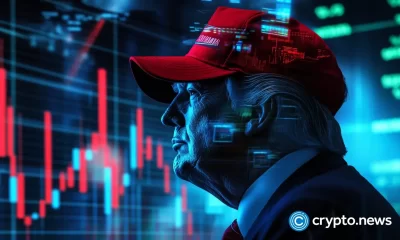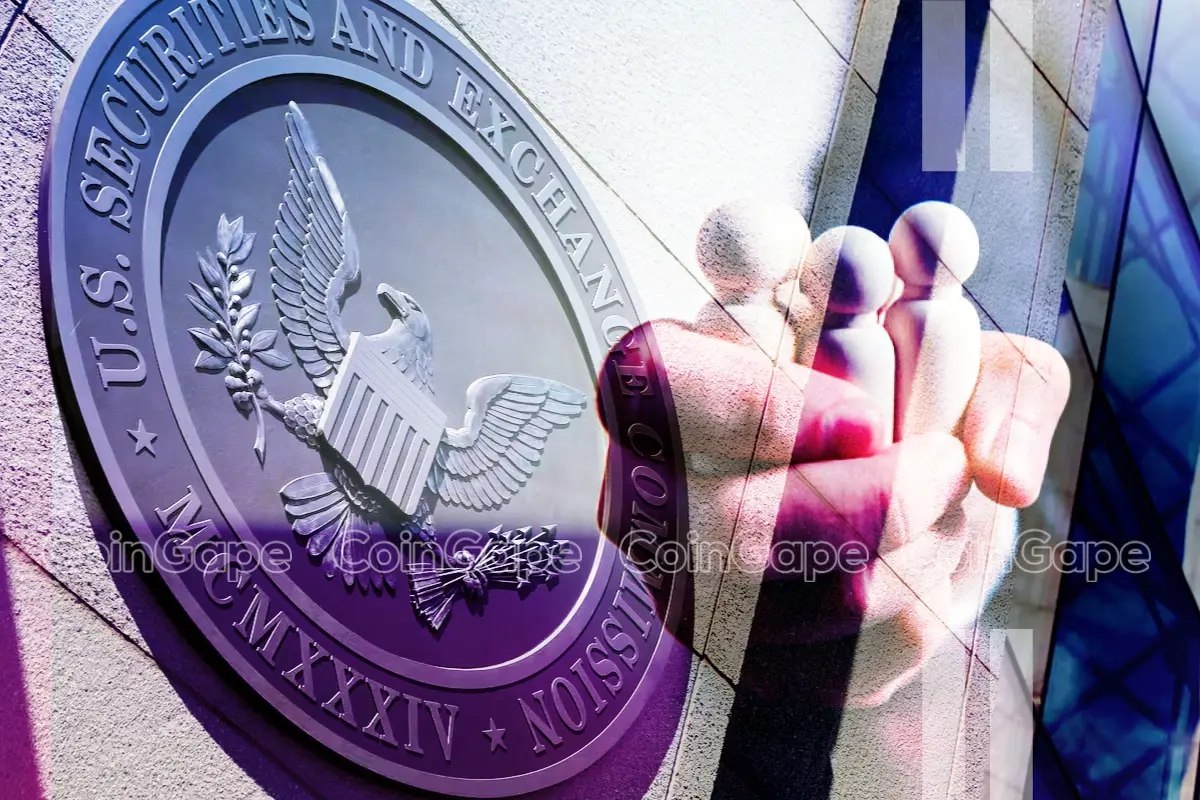coinbase
Coinbase CLO shares data on crypto hedge funds debanking, demands for answers
Published
3 months agoon
By
admin

The Coinbase Chief Legal Officer Paul Grewal took to X to demand answers after learning from the AIMA survey that 75% of crypto hedge funds face issues with accessing basic banking services. None of the traditional alternative investment managers (e.g., real estate) experienced similar troubles with the banks.
The Grewal’s X post raises questions that have already been circulating in the media for quite a while. You have probably heard of Operation Choke Point 2.0 or read about the redacted documents published by Coinbase in which the Federal Deposit Insurance Corporation openly asks banks to pause all the operations associated with cryptocurrencies. The Alternative Investment Management Association (AIMA) survey report furnishes these concerns with new statistical grounds. Alongside Grewal, AIMA calls for action in the press release.
Why would 3/4 of 160 crypto hedge funds report issues with basic banking services over 3 years when ZERO were reported by 20 other alternative investors surveyed? Why would most be told their bank is dropping them? Good on @AIMA_org for sharing this data– we need answers, now.
— paulgrewal.eth (@iampaulgrewal) December 20, 2024
The survey was held in October, and its results are concerning. Before we move to the key takeaways from the press release, we should stress that, according to AIMA, debunking is a problem exclusive to crypto hedge funds. AIMA surveyed 20 other alternative investors who were not dealing with cryptocurrencies, and none of them had issues while receiving basic banking services.
The key takeaways from the AIMA press release
The key points from the AIMA press release are as follows:
- AIMA surveyed 160 crypto hedge funds. Three-fourths of them have contested facing troubles while accessing or growing standard banking services in the last three years.
- The troubles may include complete service denial. Only 2% of the hedge funds whose relationships were about to be terminated received a formal explanation for that. The named reason was that the banks were limiting crypto clients.
- According to AIMA, debanking of crypto businesses (the so-called “Operation Choke Point 2.0”) undermines the operational efficiency of the U.S. crypto sector, negatively impacts investors’ confidence, and harms the acquisition of the skilled professionals.
John D’Agostino, a co-chair of the AIMA Digital Assets Group, concludes that the banking challenges are not a niche problem as they burden the overall development of the U.S. economy and innovation.
The complete report is available here.
AIMA calls for change, Trump vows to terminate Operation Choke Point 2.0
AIMA calls for a collaborative effort to address the challenges faced by the cryptocurrency business. The association sees the solution in working closely with the new administration, the leaders of the banking sphere, and policymakers.
During the 2024 Presidential campaign, Trump, who was demonstrating his animosity towards the original Operation Choke Point started during Obama’s White House tenure, declared that he was going to shut down Operation Choke Point 2.0 as soon as he gets elected.
However, as the statements made by Jerome Powell during the FOMC event indicate, Trump will have to deal with various cryptocurrency sceptics, including ones with massive influences and high positions.
Wait a minute! Isn’t Operation Choke Point 2.0 just a conspiracy theory?
Let’s begin with a bit of history. Unleashed during the Obama presidency, Operation Choke Point was the Department of Justice’s secretive program allegedly aimed at denying banking services to fraudsters of all kinds, including those who traded ammunition, pornography, drug paraphernalia, etc. The idea was pretty simple: if we uncompromisingly cut the access to financial operations for fraudsters, they won’t be able to break the law, and many crimes will be prevented.
Soon, the operation achieved notoriety as, due to a lack of clear limitations, debanking turned into a weapon against political enemies instead of protecting society from fraud and crime. In 2013, the program critics came to believe that fighting the political opponents was the prime goal of Operation Choke Point. During the 2016 Presidential campaign, Donald Trump promised to eliminate this operation.
While the Obama-era Operation Choke Point was deployed officially, the existence of the modern-day Operation Choke Point 2.0 is yet to be confirmed. Nevertheless, the leaked documents and cases like the ones described in the AIMA press release make people think that an operation similar to Operation Choke Point exists nowadays and targets cryptocurrency companies. The operation is in effect, disregarding its official name. Although the FDIC seems to be the main actor in the operation, there are other disjointed institutions pushing banks to limit services for clients working in the crypto sector.
Some experts covering this “operation” expressed an opinion that the FDIC attack on the crypto industry is the response to the turbulent events that shook the crypto market in 2022. It includes the FTX collapse, TerraUSD losing its peg and crashing altogether, Celsius and Voyager freezing the users’ accounts, etc.
However, let’s look closely at the documents released by Coinbase in December 2024. We will find out that the FDIC was pressing banks to stop working with cryptocurrency companies before these events. Although the cases mentioned above are not the result of the FDIC actions, they took place in circumstances where banks were already forced to pause service for the crypto clients.
Possible implications of Operation Choke Point 2.0
Banks don’t have a clear checklist to determine if the client can access services. In a situation where banks cannot decide on the risk rate they are willing to work at, they may prefer to block services for the clients dealing with cryptocurrency to avoid a backlash from the FDIC.
AIMA has already voiced the possible implications. By far, pressure on banks and a lack of clear instructions will hurdle innovation in the U.S. and make the country unattractive for companies from the cryptocurrency sector.
Source link
You may like


Analyst Says Crypto Whales Loading Up on Ethereum, Accumulating $815,514,345 in ETH in Just Five Days


Bitcoin landfill man loses appeal, says he has one ‘last legal option’


Filmmakers Bet on Web3 to Fix Hollywood Film Financing


Mr. Wonderful says the crypto cowboy era is over. Really?


TON Token Surges 20% as Telegram Founder Recovers Passport From French Authorities


Can Bitcoin Reach $100K After the Upcoming US Fed Decision?
coinbase
Coinbase (COIN) Stock Decline Can’t Stop Highly Leveraged Long ETF Rollouts
Published
21 hours agoon
March 16, 2025By
admin

Leverage Shares by Themes has launched a new exchange-traded fund (ETF) tied to the Nasdaq-listed cryptocurrency exchange Coinbase (COIN) stock despite a downturn in the crypto-related shares.
The Leverage Shares 2X Long Coinbase Daily ETF (COIG) is designed to deliver twice the daily return of Coinbase’s stock price, offering traders an amplified exposure to the U.S.’s largest cryptocurrency exchange. The ETF, which carries an expense ratio of 0.75%, is listed on Nasdaq, according to a press release.
The launch comes amid a significant cryptocurrency market downturn that saw bitcoin (BTC) drop by around 19% over the last three months, from over $105,000 to now stand at wrought $84,000. COIN shares saw even worse performance, losing nearly 42% of their value during the same period.
The new ETF allows investors to take advantage of Coinbase’s stock performance volatility without directly holding shares.
These types of single-stock leveraged ETFs, for both longs and shorts sides, are typically used for short-term trading due to the high levels of risks associated with daily compounding. The profits and losses for both types of these are amplified when the prices of the underlying stocks move significantly.
Source link
24/7 Cryptocurrency News
Coinbase Files FOIA To Reveal Cost Of SEC’s Crypto Lawsuits
Published
2 weeks agoon
March 3, 2025By
admin
Coinbase has filed a FOIA request against the US Securities and Exchange Commission (SEC), riding on the highs of the dismissal of its case against the securities regulator. A glance at the document reveals that the US-based crypto exchange is seeking a raft of information on the SEC’s expenditure in its crypto war.
Coinbase Wants Full Disclosure Of SEC Spending In Its Enforcement Actions
US-based crypto exchange Coinbase is seeking information on the SEC’s spending in its war against major entities in the cryptoverse. Coinbase has filed a Freedom of Information Act (FOIA) request against the securities regulator to obtain information on the fiscal handling of its crypto lawsuits.
According to the document, the exchange is seeking information between April 2021 and January 2025 on the Commission’s spending. Coinbase’s request spans the total annual expenditures for digital asset investigations and enforcement actions against the industry.
Coinbase is also seeking information on the number of SEC full-time staff and details of their compensation packages. Furthermore, the FOIA request wants similar information on third-party contractors including their working hours and compensation packages.
Of particular concern is the Crypto Assets and Cyber Unit with Coinbase’s filing requesting the annual budget of the unit and compensation of its staff. Several cases initiated by the unit have been dismissed with the latest being Kraken’s case dismissal with prejudice.
“The previous SEC spent four years attacking a lawful industry, and American taxpayers were left holding the bill,” said Coinbase in a statement. “How much did you end up paying? We intend to find out.”
Several High-Level Crypto Lawsuits Will Drive The Bill Up
Following the filing of the FOIA request, the cryptoverse scans the horizon for the release of figures by the SEC. The SEC has nine possible defenses in the form of exceptions to the FOIA like internal personnel rules among others.
The release of the figures could run into millions of dollars, accentuated by a streak of high-profile crypto lawsuits. During the period under review, the SEC dragged Coinbase, Ripple Labs, Gemini, and Binance to court over alleged breaches of capital market rules.
The SEC case dismissal against Coinbase has triggered a wave of similar actions for affected entities. The dismissals are in sharp contrast to the heightened enforcement actions by the Gary Gensler-led agency.
SEC Commissioner Hester Pierce has criticized regulation by enforcement previously deployed by the SEC while hailing its new forward-thinking approach.
Aliyu Pokima
Disclaimer: The presented content may include the personal opinion of the author and is subject to market condition. Do your market research before investing in cryptocurrencies. The author or the publication does not hold any responsibility for your personal financial loss.
Source link
Altcoins
Brian Armstrong Calls Memecoins ‘Canary in the Coal Mine,’ Predicts Tokenization of Identity, Songs, Votes and More
Published
3 weeks agoon
February 24, 2025By
admin
Coinbase CEO Brian Armstrong says that memecoins are the canary in the coal mine, foreshadowing a broader trend of the tokenization of culture.
In a new interview with CNBC, Armstrong says he expects memecoins to eventually lead to the tokenization of identities, votes and art.
“Memecoins in the broadest sense, I think we should find a way for artists to get paid. Anyone should be able to put artwork and get paid for it. I do think memecoins are a canary in the coal mine, that more and more of the world is going to get tokenized and put on-chain.
Every asset class, every vote, every identity, every song, every Instagram post, whatever – in the future I think more and more of these things are going to tokenized. Now, we also need to make sure people are following the law and not doing pump-and-dump schemes or insider trading, and there probably has been a little bit of that in the memecoin space which is not helping anybody.
In every crypto cycle, there seems to be people who rush in and they forget these lessons of the past, but insider trading should obviously be prosecuted and people should avoid doing that unless they want to go to prison.”
However, Armstrong admits that recent controversies surrounding memecoins – including Argentinian President Javier Milei’s LIBRA promotion – haven’t been a great look for the industry. But, he says that there is still a positive underlying path forward for digital assets.
“I do think we’re in the early stages of this industry so it’s the Wild West a little bit with memecoins right now. There’s good that comes with that which is a lot of innovation is happening.
There’s some bad happening as well from what I understand, it sounds like President Milei accidentally shared that information without actually understanding exactly what he was sharing if you believe his comments.
My hope is that this gets cleaned up and people continue to think long-term about how are we going to create real value for the billions of people in the world who need an updated financial system.”
Don’t Miss a Beat – Subscribe to get email alerts delivered directly to your inbox
Check Price Action
Follow us on X, Facebook and Telegram
Surf The Daily Hodl Mix
 

Disclaimer: Opinions expressed at The Daily Hodl are not investment advice. Investors should do their due diligence before making any high-risk investments in Bitcoin, cryptocurrency or digital assets. Please be advised that your transfers and trades are at your own risk, and any losses you may incur are your responsibility. The Daily Hodl does not recommend the buying or selling of any cryptocurrencies or digital assets, nor is The Daily Hodl an investment advisor. Please note that The Daily Hodl participates in affiliate marketing.
Generated Image: DALLE3
Source link

Analyst Says Crypto Whales Loading Up on Ethereum, Accumulating $815,514,345 in ETH in Just Five Days

Bitcoin landfill man loses appeal, says he has one ‘last legal option’

Filmmakers Bet on Web3 to Fix Hollywood Film Financing

Mr. Wonderful says the crypto cowboy era is over. Really?

TON Token Surges 20% as Telegram Founder Recovers Passport From French Authorities

Can Bitcoin Reach $100K After the Upcoming US Fed Decision?

XRP Must Close Above This Level For Bullish Breakout: Analyst

Bitcoin reclaims $80K zone as BNB, TON, GT, ATOM hint at altcoin season

Stock Market To Witness Rallies in Next One to Two Weeks, Predicts Wall Street’s Cantor Fitzgerald – Here’s Why

Cryptocurrencies to watch this week: Binance Coin, Cronos, ZetaChain

What is Milady? The Edgy Ethereum NFT Community With Vitalik Buterin’s Support

Can Pi Network Price Triple if Binance Listing is Approved Before March 2025 Ends?

Gold ETFs Inflow Takes Over BTC ETFs Amid Historic Rally

Toncoin in ‘great entry zone’ as Pavel Durov’s France exit fuels TON price rally

XRP $15 Breakout? Not A Far-Fetched Idea—Analysis

Arthur Hayes, Murad’s Prediction For Meme Coins, AI & DeFi Coins For 2025

Expert Sees Bitcoin Dipping To $50K While Bullish Signs Persist

Aptos Leverages Chainlink To Enhance Scalability and Data Access

Bitcoin Could Rally to $80,000 on the Eve of US Elections

Sonic Now ‘Golden Standard’ of Layer-2s After Scaling Transactions to 16,000+ per Second, Says Andre Cronje

Institutional Investors Go All In on Crypto as 57% Plan to Boost Allocations as Bull Run Heats Up, Sygnum Survey Reveals

Crypto’s Big Trump Gamble Is Risky

Ripple-SEC Case Ends, But These 3 Rivals Could Jump 500x

Has The Bitcoin Price Already Peaked?

A16z-backed Espresso announces mainnet launch of core product

Xmas Altcoin Rally Insights by BNM Agent I

Blockchain groups challenge new broker reporting rule

Trump’s Coin Is About As Revolutionary As OneCoin

Is $200,000 a Realistic Bitcoin Price Target for This Cycle?

Ripple Vs. SEC, Shiba Inu, US Elections Steal Spotlight
Trending

 24/7 Cryptocurrency News4 months ago
24/7 Cryptocurrency News4 months agoArthur Hayes, Murad’s Prediction For Meme Coins, AI & DeFi Coins For 2025

 Bitcoin2 months ago
Bitcoin2 months agoExpert Sees Bitcoin Dipping To $50K While Bullish Signs Persist

 24/7 Cryptocurrency News2 months ago
24/7 Cryptocurrency News2 months agoAptos Leverages Chainlink To Enhance Scalability and Data Access

 Bitcoin4 months ago
Bitcoin4 months agoBitcoin Could Rally to $80,000 on the Eve of US Elections

 Altcoins2 months ago
Altcoins2 months agoSonic Now ‘Golden Standard’ of Layer-2s After Scaling Transactions to 16,000+ per Second, Says Andre Cronje

 Bitcoin4 months ago
Bitcoin4 months agoInstitutional Investors Go All In on Crypto as 57% Plan to Boost Allocations as Bull Run Heats Up, Sygnum Survey Reveals

 Opinion4 months ago
Opinion4 months agoCrypto’s Big Trump Gamble Is Risky

 Price analysis4 months ago
Price analysis4 months agoRipple-SEC Case Ends, But These 3 Rivals Could Jump 500x



✓ Share: